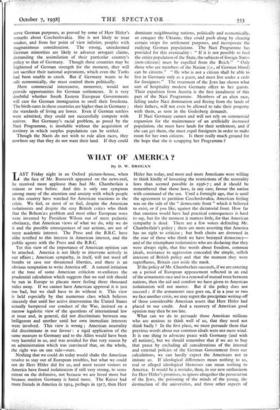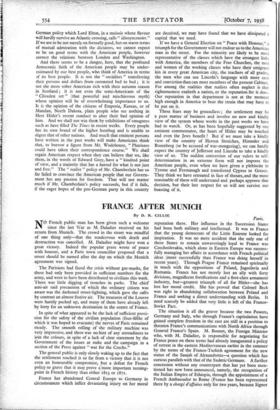WHAT OF AMERICA ?
By D. W. BROGAN
Yet this view of the importance of American opinion can be attacked. America is not likely to intervene actively in our affairs ; American sympathy, in itself, will not ward off bombs or save our threatened liberties, and there is an obvious temptation to write America off. A natural irritation at the tone of some American criticism re-enforces the prudential calculation which suggests that no real risk should be run in Europe to placate mere feeling three thousand miles away. If we cannot have American approval it is just too bad, but we shall have to do without it. This view is held especially by that numerous class which believes sincerely that until her active intervention the United States actually hampered our conduct of the War, insisted on a narrow legalistic view of the questions of international law at issue and, in general, did not discriminate between one belligerent and another until her own immediate interests were involved. This view is wrong ; American neutrality did discriminate in our favour : a rigid application of the same measure to Germany and to the Allies would have been very harmful to us, and was avoided for that very reason by an administration which was convinced that, on the whole, the right was on one side—ours.
Nothing that we could do today would shake the American resolve to stay out of European troubles, but what we could not do Herr Hitler did for us, and most recent visitors to America have found isolationism if still very strong, to some extent on the defensive, not because we are loved more but because modem Germany is hated more. The Kaiser had more friends in America in 1914, perhaps in 1917, than Herr Hitler has today, and more and more Americans were willing to think kindly of loosening the restrictions of the neutrality laws than seemed possible in 1936-7 ; and it should be remembered that those laws, in any case, favour the nation with command of the sea. Until a fortnight ago, that is until the agreement to partition Czechoslovakia, American feeling was on the side of the " democratic front " which it believed to exist, or if you like, against the dictatorial front. How far that emotion would have had practical consequences is hard to say, but for the moment it matters little, for that American sympathy is dead. There are a few voices defending Mr. Chamberlain's policy ; there are more asserting that America has no right to criticise ; but both choirs are drowned in the roar of those who think we have betrayed democracy— and of the triumphant isolationists who are declaring that they were always right, that fine words about freedom, common ideals, resistance to aggression concealed the simple, selfish interests of British policy and that the moment they were superfluous, Britain cast aside the mask.
If the policy of Mr. Chamberlain succeeds, if we are entering on a period of European appeasement reflected in an end of the armaments race and in a renewal of mutual trust between nations, then the aid and comfort we have given to American isolationism will not matter. But if the policy does not succeed ; if the armaments race goes on, if in a year or two we face another crisis, we may regret the precipitate writing-off of those considerable American assets that Herr Hitler had placed to our credit. And a recovery of American good opinion may then be too late.
What can we do to persuade those American millions who are anxious to think well of us, that they need not think badly ? In the first place, we must persuade them that previous words about our common ideals were not mere wind. It is one thing to advocate peace with Germany (and with all nations), but we should remember that if we are to buy that peace by excluding all considerations of the internal and external policies of the German Government from our calculations, we can hardly expect the Americans not to imitate us. If ideological differences mean nothing to us, real or alleged ideological likenesses can mean nothing to America. It would be a mistake, then, in our new enthusiasm for Herr Hitler's promises, to ignore altogether the persecution of the Jews, the poisoning of the minds of the young, the destruction of the universities, and those other aspects of German policy which Lord Elton, in a meiosis whose flavour will hardly survive an Atlantic crossing, calls " idiosyncrasies." If we are to be not merely on formally good, but on warm terms of mutual admiration with the dictators, we cannot expect to be on good terms with the American people, however correct the relations between London and Washington.
And there seems to be a danger, here, that the profound democratic faith of the American people may be under- estimated by our best people, who think of America in terms of its best people. It is not the " socialites " transferring their persons and dollars from coroneted bed to bed ; it is not the more sober American rich with their autumn season in Scotland ; it is not even the semi-Americans of the " Cliveden set " (that powerful and mischievous myth) whose opinion will be of overwhelming importance to us. It is the opinion of the citizens of Emporia, Kansas, or of Mandan, North Dakota, plain people who see nothing in Herr Hitler's recent conduct to alter their bad opinion of him. And we shall not win them by exhibitions of smugness such as have filled The Times in recent weeks. Every people has its own brand of the higher humbug and is unable to digest that of other nations. And much that eminent persons have written in the past weeks will make Americans think that, to borrow a figure from Mr. Wodehouse, " Pharisees could have taken their correspondence course." We shall regain American respect when they can believe that we, like them, in the words of Edward Grey, have a " kindred point of view, and a majority that has a hatred for what is not just and free." The " realist " policy of Mr. Chamberlain has so far failed to convince the American people that our Govern- ment has any passion for freedom. That will not matter much if Mr. Chamberlain's policy succeeds, but if it fails, if the eager hopes of the pro-German party in this country are deceived, we may have found that we have dissipated a capital that we need.
If we have a General Election on " Peace with Honour," a triumph for the Government will not endear us to the American man in the street. For the minority are likely to be most representative of the classes which have the strongest links with America, the members of the Free Churches, the men and women of the working classes who have their emigrant kin in every great American city, the teachers of all grades, the men who can use Lincoln's language with more ease and conviction than can most members of the present Cabinet. For among the realities that realists often neglect is that righteousness exalteth a nation, or the reputation for it does. Our reputation in that department is not at the moment high enough in America to bear the strain that may have to be put on it.
These fears may be groundless ; the settlement may be a pure matter of business and involve no new and kindly view of the system whose works in the past weeks we have had to watch. Or, as has been hopefully suggested by one eminent commentator, the heart of Hitler may be touched and even the Jews benefit ! But if we must take a kindly view of the country of Herren Streicher, Himmler and Rosenberg (or be accused of war-mongering), we can hardly expect the country of Jefferson and Lincoln to take a kindly view of us. The sudden conversion of our rulers to self- determination in an extreme form will not impress the American people, even when we have given a plebiscite in Tyrone and Fermanagh and transferred Cyprus to Greece. They think we have retreated in face of threats, and the more reasonable of them will understand and perhaps approve that decision, but their last respect for us will not survive our boasting of it.















































 Previous page
Previous page